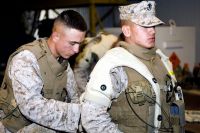WASHINGTON, Oct. 15, 2010 — Marines at Camp Pendleton, Calif., got a glimpse last week into what’s likely to be the training environment of the future: one that injects live actors, animatronics, projected avatars and other sensory enhancements to replicate the sights, sounds, smells and stresses of combat — and demands the same razor-sharp decision-making processes and responses.
The Marines, many recently returned from combat deployments, tested out some of the virtual reality-based training concepts U.S. Joint Forces Command is exploring to better prepare ground troops for complex operating environments, Jay Reist, who’s heading up the effort, told reporters yesterday.
Reist is program manager for what Joint Forces Command calls its “future immersive training environment joint capability technology demonstration.” The two-year project, nearing its completion, is part of a broad Defense Department-wide campaign to make ground-based simulation as realistic as possible.
The demonstration combines emergent technologies in a realistic urban training environment, based on real deployment experiences. Its goal, Reist said, is to improve pre-deployment training for the most vulnerable warfighters: dismounted troops operating at the small-unit level.
“We’re really focused at the small unit, infantry squad level and providing them capabilities using emerging technology to create a learning experience for them to be better prepared for the complex environments that they go into,” he said.
The project aims to hone their decision-making processes so they’re better poised to react to stressful, tactically challenging situations, he said.
Marines tested the concept over the past few months at Camp Pendleton’s infantry immersion trainer, wrapping it up during an intensive four-day event last week.
Confronted with five rigorous scenarios in a three-dimensional mock Afghan village intentionally designed to induce stress and a sense of “being there,” the Marines interacted with friendly, as well as hostile, villagers as they conducted their missions.
Throughout the scenarios, they had to make the same sometimes split-second, life-and-death decisions required during deployments: What feels right and what doesn’t? And what’s the best way to respond when things don’t feel right?
While the Marines negotiated the scenarios multiple times, Reist and his team monitored their every movement through sensors attached to their helmets, weapons and knees, and video and audio recorders strategically placed throughout the venue. The team also monitored the Marines’ heart rates and other vital signs to assess their stress levels during the exercise.
“Through the technology we have emplaced in that venue, we can track every single step they took,” Reist said. Integrated with real-time audio and camera feeds that capture every action taken and word spoken, “we have ground truth on everything that took place within that scenario, in that venue, and that learning environment,” he said.
Afterward, the evaluators joined unit leaders in conducting debriefings and extensive after-action reviews of what went right, what didn’t, and what areas needed improvement.
The result, Reist said, was that participants performed better each time they ran through the scenarios. To scientifically verify that, the evaluators gave the Marines two situational judgment tests developed by Joint Forces Command’s subject-matter and human-performance experts. One was administered before the Marines ran through the scenarios, and the other after.
“You can pretty much, based on the data we captured, get a good diagnostic of the learning experience that they went through,” Reist said.
He emphasized the importance of consistently threading key themes throughout mission preparation, execution and review.
“We have set the environment for decision-making,” he said. “It really sets them up and creates mental models so that when they do go into the real thing, they have seen it before and they have been there before.”
That helps get teams and small-unit leaders to the point where “they are really better at decision-making and making sense of the environment,” he said.
Last week’s exercise built on progress made since Marines at Camp Lejeune, N.C., and soldiers at Fort Benning, Ga., tested the first spiral of the demonstration project in March and April.
That exercise emphasized virtual training, with realistic digital towns and players replicating warfighter experiences in both Afghanistan and Iraq.
The Camp Pendleton exercise, spiral two of the demonstration project, took that training experience to the next level, Reist explained. With an emphasis on live training, it merged virtual and live capabilities to present participants with both physical and mental challenges.
While better preparing warfighters to operate in demanding and highly stressful environments, Reist cited another, initially unintended, benefit of immersive training: preventing post-traumatic stress.
“The more you can ramp up the intensity of training prior to traumatic experiences in combat, the more you are going to mitigate that post traumatic stress on the other end,” he said.
Recently returned combat troops also appear to benefit from re-immersing themselves in a highly charged environment similar to what they left behind, he said.
“From what I saw, it was healthy for them to get back in,” Reist said, citing research and studies showing similar findings. “I can’t tell you that that’s empirically true. But anecdotally, watching those young men get back into an immersive environment, I think it’s a healthy thing to do.”
Source:
U.S. Department of Defense
Office of the Assistant Secretary of Defense (Public Affairs)

 von
von 